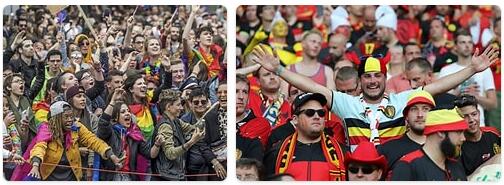In Belgium, the first elections were held on 21 May 1995 after the introduction of the new constitution which transformed Belgium into a federal state. At the same time as the Belgians elected members to parliament, they also had to elect the 75 members to the three new local assemblies in Brussels, Flanders and Wallonia. Dehae achieved a comfortable victory in the parliamentary elections, and he continued as government leader.
The 1996 budget, which sought to limit the government deficit to 3% of gross domestic product, was the subject of heated discussions between the government and trade unions which considered the cuts in public spending to be too harsh. At the end of the year, a number of scandals, in conjunction with the Vlaamse Blok’s remarkable progress, raised the question of Belgium’s survival as a nation. The disclosures in the pedophilia case against Marc Dutrox questioned the confidence of the political and legal authorities who had revealed during the case a pervasive incompetence, internal rivalry and corruption. Guy Coëme, former Vice President and Minister of Defense, was also charged and convicted of fraud and corruption in 1996, along with a further 6 leading members of the Socialist Party.

The then Member of the European Parliament, Frank Van Hecke, declared in June 1996 that his party, the Vlaamse Blok, was willing to make Brussels the test cloth to dissolve the Belgian state. Vlaamse Bloks proposed to reunite Flanders with the Netherlands; at the same time, the party launched a fierce campaign to grant non-European immigrants the right to vote. Human rights organizations drew attention to the growing xenophobic tendencies when in November 1997 police killed drug dealer Said Charmi by 14 shots. It was a police operation, which several witnesses later described as a veritable execution. An opinion poll conducted that month revealed that 74% of French-speaking Belgians could not identify with the goals set by Belgian society.
A few days before the 1999 elections, the country was shaken by a new scandal as food appeared in stores contaminated with dioxin. The scandal brought down the Dehaene government and paved the way for a coalition government led by Guy Verhofstadt, leader of the Flemish liberals. He formed government with Social Democrats and Greens from both language areas. Thus, for the first time in 41 years, the Christian Democrats were excluded from the government. Former President of the Greens in the European Parliament, Magda Aelvoet was named Health Minister responsible for Food Control and for resolving the dioxin crisis left by the departed government. In the municipal elections of October 2000, the Vlaams Blok became the largest party in the two most important Belgian cities, Brussels and Antwerp.
In 2001, the politicians Lambermont signed the agreement, which involved decentralization of state power. Control of agriculture, foreign trade and development aid was transferred to Flanders and Wallonia respectively. However, food safety remains a federal concern. The decentralization was a consequence of the food scandals that had shaken the country in previous years in the form of, among other things. madness, chicken plague and dioxin residues in the food. The scandals forced the Dehaene government to step down, and the government power was instead taken over by a coalition led by Guy Verhofstadt, leader of the Flemish Liberal Party (VLD). The coalition also included social democrats and Greens. For the first time in 41 years, a government was thus deployed without the participation of the Christian Democrats.
One result of the 1993 Genocide Act was that crimes against humanity could be prosecuted in Belgium, no matter where on earth they might have been committed. Thus, in 2001, four nuns from Rwanda were convicted of their participation in the 1994 Rwanda genocide, which is why Israel’s Prime Minister Ariel Sharon canceled his official visit to Belgium that year. According to thesciencetutor, a number of surviving Palestinians from the Sabra and Shatila massacre in Beirut in 1982 had sued him in Belgium for his responsibility for the massacre.
